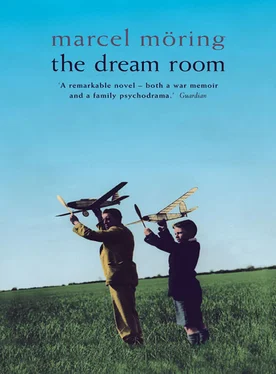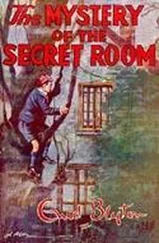At the club they were busy dismantling the airstrips. The winch was still there at the end of the runway and his friend Benno, two years his senior, was standing beside it, waiting for the cart to take it away.
‘I want to go up, just one more time,’ said my father suddenly.
‘They’ll never let you,’ Benno said.
‘But if you’d help me … We might not be able to fly again for another three or four years.’
‘You’ll be suspended if you fly without permission.’
‘What difference does it make, if I can’t fly anymore anyway? Come on, Benno. Just once.’
Benno looked around nervously. The governors were sitting in the wooden clubhouse, drinking coffee and discussing the future. The sun was behind them and it was very unlikely that anyone would be able to see, with all that light in their eyes, what was going on farther down the airstrip. When they heard the winch starting up, they might come running. But by then it would be too late.
The boys ran to the hangar and rolled out the last plane that had been brought in. It was the chairman’s plane, and it had been standing on the airstrip that morning, ready for take-off, when the news came in about the invasion. As they lifted the slender wings and began pushing the plane out the door, Benno looked at my father over the top of the fuselage. ‘I know what you’re doing,’ he said. My father, who didn’t even know himself what he was doing, said nothing. ‘I’m going to be in trouble with the whole club and your whole family,’ Benno said. ‘This is Hendriks’s plane, and he’s the town clerk. What’s he going to say when he sees you taking off …’ The plane was now at the start of the airstrip. Benno ran to the winch to get the tow cable. My father lifted up the canopy and inspected the cockpit. When Benno came back and hooked him up to the cable, my father, who was beginning to understand what his friend had meant, said: ‘Why don’t you come with me, Benno? Anything is better than staying.’ The other boy shook his head. ‘Somebody’s got to work the winch. And besides, I don’t want to leave my family.’ They both stared down at the dry grass. Then Benno turned and ran back to the winch. My father crawled into the cockpit and shut the canopy.
Even before he felt the first tug of the cable, he began to have second thoughts. Leave his family … His father was right. He was responsible for the people who worked for him. The aeroplane slid across the grass and righted itself. He had to stay. He was responsible, too. He had to help his father. They can save themselves … How could he have … The plane cleared the ground. Benno, who was standing in the distance next to the winch, zoomed in closer. My father felt the explosion of pleasure in his stomach that he always felt when he was airborne. He was pressed back in his seat. He adjusted the trim, the airstrip disappeared under the nose of the plane and he began climbing.
When he was free of the cable and looked back over his right wing he saw, far down below, over his shoulder, a tiny group of people standing between the clubhouse and the winch. Suddenly his doubts vanished. The field went shooting by under him as he steered a course for the dunes, which were a distant yellow strip in the green countryside. Once he was flying over the sand he would use the updraught to gain height. It was a sunny day and there would undoubtedly be a thermal to give him the lift he needed for a good point of departure.
He reached England, though just barely. He had no map, navigated by means of the sun and his watch, but at the end of the day, flying dangerously low, the coast appeared and he managed, hungry, exhausted, dying of thirst, to set the glider down just outside a village. A month later he was taken in as a boarder by a Dutch family living in London and two years after that he began his training as a fighter pilot.
It was this training that enabled him to earn a living after the war: first flying a mail plane, then in the little planes that sprayed the endless fields of grain on the reclaimed land of the Zuyderzee Polders. Later still, when the country was prosperous again, he and his fellow pilots also flew over the smaller fields on old land, where they’d dive down behind one row of trees, let the mist billow behind their wings, and then shoot back up, just before the next wooded bank. Those were the days when, as my father had told me, they’d land at noon in a meadow behind a village pub, climb out of the cockpit, and go inside for a plate of fried eggs.
Different people will give different periods in their lives as a clear point in time, the moment when life itself suddenly seems so simple, and things and events seem to fit together with such ease, that one later wonders how on earth life could have been so obvious, what the secret was. There probably is no secret, it’s the kind of memory that plays up more strongly than all the rest, a recollection tinged with melancholy and regret that makes one yearn for those days of freedom, the seeming wealth of possibilities, the first nudge in the back that later becomes the rhythm of life itself, grown-up-life. For my father, that clear point in time was back in the days when he flew a spray plane. He never spoke about the war. He had fought in it, he had survived, he had known friendship and disappointment. For some strange reason those days, for him, were not coloured by romantic notions. The few instances in which he spoke about his life as a fighter pilot, his mouth grew thin and tight and he invariably said that war was a filthy business. But in that spray plane, he felt better than ever before. He could do anything, he did everything. He saw everything, he knew everything. When he flew, his mind emptied and there was nothing but the thrust of the plane, the slow movement of his head to the left, the glance over his shoulder, toward the swelling horizon, the green that filled his range of vision until he began to roll and the grass and the trees and the houses and the roads and the railway lines whirled around him in a haze.
One morning in June, after he had sprayed a potato field, and was flying low over the roof of the adjacent farm, he saw the farmer’s wife and her children standing on the gravel next to the barn. He picked up speed, rolled to the right (his least favourite side, but to the left was a row of tall poplars) and shot back across the field. Somewhere above the wooded bank that bounded the land, he brought up the nose until he felt the upward thrust fighting the downward pull. He kept on pulling the stick, looked left and saw the horizon swerve. At the height of the loop, the engine sputtered. That often happened if the plane rose sheer for too long, the fuel pipes sometimes emptied. As soon as the nose was pointed down, the kerosene would get to the engine again.
But this time it didn’t. The horizon tilted, the nose dropped, the engine remained silent. He pulled the stick back, aware that he had insufficient height to come back around if the engine didn’t ignite. Then he heard it, the harsh roar. The nose went up, the potato field, which had been coming straight at him, went gliding under him. Now he was flying so low that the tops of the trees at the edge of the field seemed to tower above him. He threw the stick left and pulled it towards him. The wooded bank became a haze and disappeared. He had no time to look over his shoulder, but knew he was flying dangerously close to the ground. He pressed back in his seat, pulling hard on the control stick. Now he could no longer see the trees. He pulled a little more, moved the control stick to the middle and noticed that he only had a little speed left. The engine sputtered again and fell silent. He was now drifting crookedly over the field, at a height of ninety feet or so, a wooden fence before him, and behind that, a ditch, meadow, and cows. He pulled left slightly and kept on turning. The farm came into view again. Standing there, like tiny figures drawn in pencil, were the farmer’s wife and her children. He could clearly see that they were waving: five pairs of insect legs against the wall of the barn. He screamed with anger and helplessness, rammed his fist down on the start button, heard nothing and yanked the stick to the right. The plane shot over the fence. Shortly afterwards he felt the ground, the wild jolting as he bounced over the bumpy meadow. He could barely see in front of him and when the left wing hit the cow’s head and he lost the last bit of control he had over the plane, he was so amazed that, for an entire second, he forgot everything else.
Читать дальше







![Theresa Cheung - The Dream Dictionary from A to Z [Revised edition]](/books/618735/theresa-cheung-the-dream-dictionary-from-a-to-z-r-thumb.webp)
![Theresa Cheung - The Dream Dictionary from A to Z [Revised edition] - The Ultimate A–Z to Interpret the Secrets of Your Dreams](/books/692092/theresa-cheung-the-dream-dictionary-from-a-to-z-r-thumb.webp)



